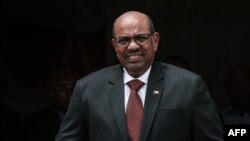Some South Sudan opposition parties that signed a power-sharing deal in Khartoum say they did so to give peace a chance even though they disagree with some of the agreement’s provisions.
However, the Intergovernmental Authority on Development, an African trade bloc that brokered the peace process, issued a press release Tuesday in which it said Sudanese mediators, including President Omar Hassan al-Bashir, would continue facilitating the talks until a revitalized peace agreement for South Sudan was finally signed.
According to the IGAD statement, Kenyan President Uhuru Kenyatta will send a team of experts to support the continuation of the peace process in Khartoum. There had been reports the talks would possibly be moved to another location.
Group not happy with agreement
Bangasi Joseph Bakosoro, leader of the South Sudan National Movement for Change, said the South Sudan Opposition Alliance and the Former Detainees group initially did not want to sign the deal on Sunday because some of their demands had not been met in the Khartoum agreement, such as reverting to the original 10 states, down from the current 32 states.
Bakosoro said his group agreed to sign the deal only after Sudanese Foreign Minister Al-Dirdiri Mohammed Ahmed informed the group, in writing, that as a chief mediator, he would reopen discussions on the outstanding issues in the next round of talks.
“Most of us did not like to sign the agreement. That is a given fact. But ... we are waiting to start debate on the outstanding issues,” Bakosoro told VOA's South Sudan in Focus.
No date has been announced as to when discussions on the outstanding issues will resume.
The South Sudan Opposition Alliance and the Former Detainees group have raised concerns about a provision in the deal that provides for the creation of an Independent Boundaries Commission to determine the number of states in South Sudan.
Bakasoro said his group, which is part of the South Sudan Opposition Alliance, agreed to sign the deal only with the caveat that such issues would be resolved in a timely fashion.
“That made us sign the agreement, and we are hoping that in the near future we are going to finalize the outstanding issues and complete the High Level Revitalization Forum [as the peace talks are known], and then we wait for the final signing,” Bakasoro told VOA.
'Other opposition parties'
Peter Mayen, head of the People's Liberal Party, part of a group referred to as the “other opposition parties,” said his group agreed to sign the deal with the same understanding. He said the success or failure of the agreement would depend on whether it was fully implemented.
“South Sudanese really are in dire need of peace irrespective of the positions of the parties, irrespective of outstanding issues. People want the guns to go silent, people want opportunities to rebuild the economy and people want to impact in a genuine democratic transformation,” Mayen told South Sudan in Focus.
Mayen said once a final deal was signed, all parties must work to provide basic services to the South Sudanese people.
The armed opposition group known as the National Salvation Front (NAS), led by a former deputy army chief of staff, General Thomas Cirillo, declined to sign the agreement. He told South Sudan in Focus on Tuesday that the NAS had not authorized any person to sign the deal on its behalf.
NAS disputed signature
Major General Julius Tabuley Daniel, who declared himself the interim chairman of NAS, signed the deal, but Cirillo said Tabuley was not a legitimate representative of NAS.
“You have a few individuals who are not satisfied with [what] NAS is doing in terms of this peace process, because, for them, they just want to go to Juba. Maybe they are tired and for their own reasons they decided to leave NAS,” Cirilolo told South Sudan in Focus.
He said three or four individuals have been in contact with security authorities in Juba “to cause problems within NAS” and traveled to Khartoum to take part in the talks. “They represent themselves,” he said, not the NAS.
